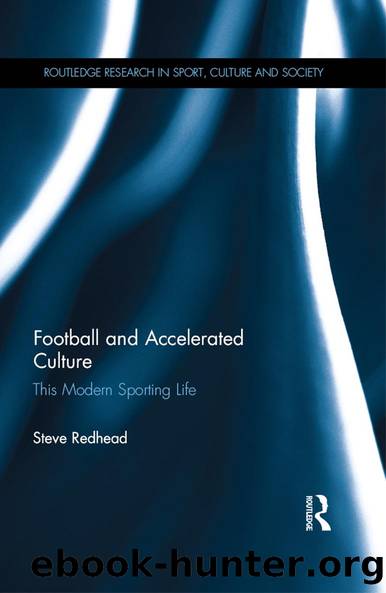Football and Accelerated Culture by Steve Redhead

Author:Steve Redhead [Redhead, Steve]
Language: eng
Format: epub
ISBN: 9781317411536
Google: xBNWuwEACAAJ
Publisher: Routledge
Published: 2015-01-15T02:47:37+00:00
6 Weâre not racist, we only hate Mancs
Drawing on the details of my extensive long-term football hooligan memoir research project, this chapter questions the idealist notion of football hooliganism as resistance and demonstrates how some far right groups like the English Defence League (EDL) and Welsh Defence League (WDL) grew out of football hooliganism and the way in which football culture in Europe has been linked to fascism and racism in recent times. It emphasises concepts which have become a peripheral part of realist criminology, especially the idea of reproletarianisation which I have developed in this context of a more precarious globe, a process which has accelerated after the 2007/8 Global Financial Crash and threatens to make a middle class lifestyle well nigh impossible for millions around the globe, as well aiding the rise of the radical right. Reproletarianisation, namely the idea that the economic system is hollowing out the âsocialâ and reproletarianising the population in a global social and cultural process of âdouble freedomâ, in which, as Karl Marx indicated, most people only have their labour power to sell though they are free to sell it to whoever they choose, is manifesting itself in many different ways. Football hooliganism is shown to be one such manifestation.
In this chapter I want to look at the development of post-subculture as a concept for understanding recent changes in the nature of football fandom and the limitations of using it in a rapidly changing culture which is âclaustropolitanâ rather than cosmopolitan and in which âharmâ is having to be radically reconceptualised (Hall and Winlow, 2015). Especially, in this context, I want to consider football hooligan fandom and its links to what has been called a ânew racismâ. There is a long tradition of academic work on football hooligan fandom (Ingham, 1978, Cohen and Robins, 1978, Robins, 2011, Dunning, Murphy and Williams, 1984, 1988, 1991, Armstrong, 1998, Giulianotti, 1999, King, 2008, Dunning, Murphy and Waddington, 2002, Frosdick and Marsh, 2005, Stott and Pearson, 2007, Sugden, 2007, Armstrong and Testa, 2010). In order to develop the use of post-subculture to enlighten us about changes in football fandom I draw on the hit and tell research project which I directed, archiving football hooligan memoirs in order to improve our ethnographic understanding of fandom in general and racist and fascist hooliganism in particular.
The research project reported on here contains some insights for the disciplines of cultural studies on the one hand and criminology on the other, and, within these disciplines, the respective sub-disciplines of post-subcultural studies and critical criminology. A certain rethinking of the concept of subculture, as if we are now âafter subcultureâ (Bennett and Kahn-Harris, 2004) or âbeyond subcultureâ (Huq, 2006), has taken place. Strictures about gender blindness in subcultural research are as relevant to what have been called the new ethnographies (Pearson, 2011, 2012, 2014) of football hooligan subcultures as ever they were.
Nevertheless, the emergence of âpost-subcultureâ and the subsequent imagining of the figure of the âpost-subculturalistâ and the development of a sub-discipline of
Download
This site does not store any files on its server. We only index and link to content provided by other sites. Please contact the content providers to delete copyright contents if any and email us, we'll remove relevant links or contents immediately.
The Inner Game of Tennis by W. Timothy Gallwey(3682)
Unstoppable by Maria Sharapova(3523)
Crazy Is My Superpower by A.J. Mendez Brooks(3398)
Urban Outlaw by Magnus Walker(3393)
Mind Fuck by Manna Francis(3180)
The Social Psychology of Inequality by Unknown(3023)
The Fight by Norman Mailer(2930)
Unstoppable: My Life So Far by Maria Sharapova(2501)
Accepted by Pat Patterson(2366)
Going Long by Editors of Runner's World(2360)
Futebol by Alex Bellos(2357)
Backpacker the Complete Guide to Backpacking by Backpacker Magazine(2244)
Sea Survival Handbook by Keith Colwell(2241)
The Happy Runner by David Roche(2234)
Motorcycle Man by Kristen Ashley(2232)
The Sports Gene: Inside the Science of Extraordinary Athletic Performance by David Epstein(2175)
Peak: Secrets from the New Science of Expertise by Anders Ericsson & Robert Pool(2033)
Endure by Alex Hutchinson(2023)
The Call of Everest by Conrad Anker(1908)
